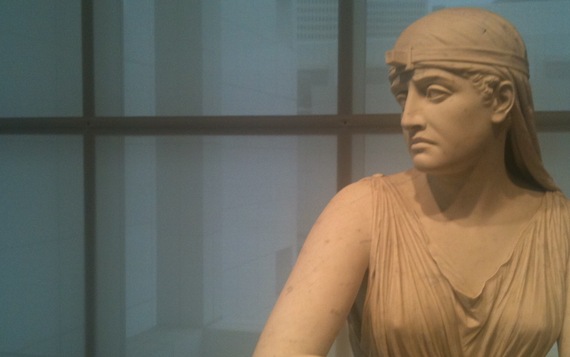Some 371 million Powerball tickets were sold last week, and to all but an astronomically fortunate and minuscule number of individuals, the universe seemed to return an answer of, "No, not you." More than the lost prospect of sudden wealth, it is the sinking dissolution of so many hundreds of thousands of imagined new beginnings that brings such glumness in the wake of the lottery drawing. The question is how one takes such an answer - or whether one takes it at all.
Hannah Arendt, in The Human Condition, says, "The life span of man, running toward death, would inevitably carry everything human to ruin and destruction if it were not for the faculty of interrupting it and beginning something new, a faculty which is inherent in action like an ever-present reminder that men, though they must die, are not born in order to die but in order to begin." That is what so many were hoping for this past week, not money in and of itself so much as an interruption of regularly scheduled life, the start of something new. Mismatched, infelicitous - let's come right out and say it: losing numbers leave the feeling of imprisonment, of a wonted, workaday, forced march of life, bereft of a lightening thunderbolt.
In the Torah this week, we read about God hardening Pharaoh's heart. Theologically, it is a problematic notion, so much suffering because God makes the king unchangeable - even if it were Pharaoh alone bearing the plagues, how would that be fair?
The Jewish mystical tradition takes especial note of an unusual command at the very start of this week's reading. Instead of saying, "Go unto Pharaoh," God says to Moses, "come." In a reading of scripture - and of cosmos, and of life - in which everything is an aspect of the Divine, this odd imperative underscores that Pharaoh, too, is somehow part of an ultimate verity. The Blessed Holy One has not brought a world into being that is all liberty and expansiveness. There are times and places in which God, too - as it were - is stuck.
That is the presence, the reality into which Moses is commanded to come - and what does he bring with him by way of a solution? Not certainty in opposition to Pharaoh's obstinacy, but rather insistence on open-ended possibility wedded to commitment: "Until we arrive there, we ourselves do not know with what we shall serve the Eternal One," says Moses to the intransigent monarch.
"What is more tragic than to see a person who has risen to the disciplined heights of tough-mindedness but has at the same time sunk to the passionless depths of hard-heartedness?" That is the powerful question the Reverend Dr. Martin Luther King Jr. asks rhetorically in his 1963 Strength to Love. By contrast, King urges us to cultivate "a tough mind and a tender heart."
It is a challenging order. Rigor and discipline in our thinking - powerful, as attributes go - do tend, if we are not careful, to bring along rigidity in action. We develop accustomed sureness about what is effective and what is possible, our hearts toughening along with our minds. Before we know it, we have reasoned ourselves into all sorts of corners, and woe betide anyone who dares to suggest that life may be otherwise.
Elizabeth Grosz, reading the French philosopher Luce Irigaray, suggests that "the divine is not simply the reward for earthly virtue, all wishes come true; it is rather the field of creativity, fertility, production, an always uncertain and preempted field. It is the field or domain of what is new, what has not existed before, a mode of transcendence, a projection of the past into a future that gives the present new meaning and direction." In that way of thinking, divinity is antithetical to any kind of status quo.
I rather think that our Jewish tradition is wise to perceive that solidity and suppleness, love and law, in cosmos and in life, are actual and essential aspects of truth. I also think our tradition is wise to conceive of human life as questing toward these realities and their balance. We inherit and can learn traditions that may edify and ennoble us - and, at the same time, if we listen closely, we are heirs to an awareness that we are called to shape reality. In that pursuit, discipline and resolute work are more reasonably promising than a quick $2 bet; but that fact should not argue against the worth of dreams. We must not take our lot lying down.
So alright, the enormous majority of us may not be one in 292 million, which are the Powerball odds. No, we are each a unique one in 7.4 billion human beings - and, as such, in possession of what may well be this universe's ultimate winning lottery ticket. Do not fail to come forward and claim the prize.
"A new heart also I will give you, and a new spirit I will put within you; and I will take away the stony heart out of your body, and I will give you a heart of flesh." Ezekiel 36:26

